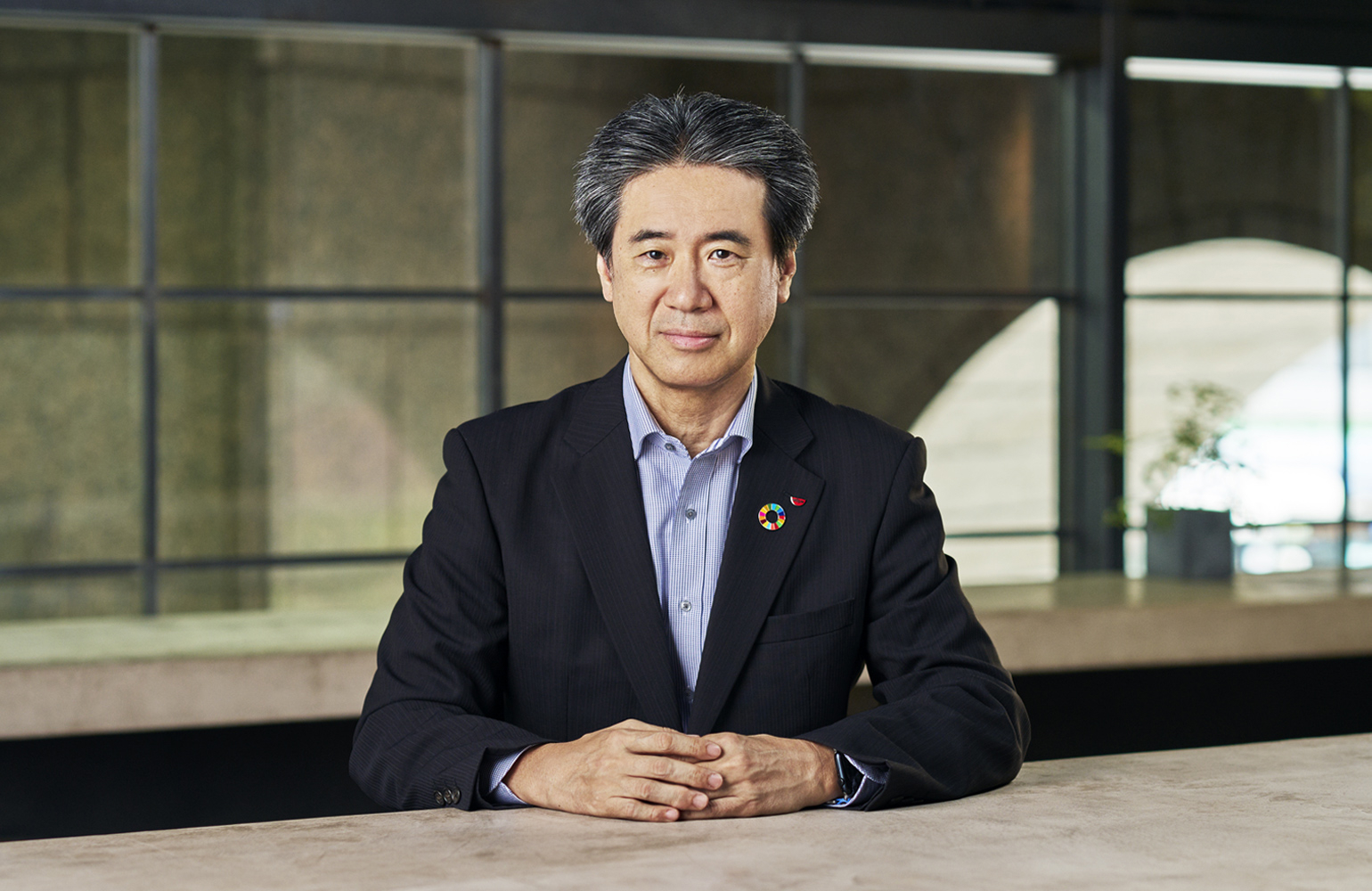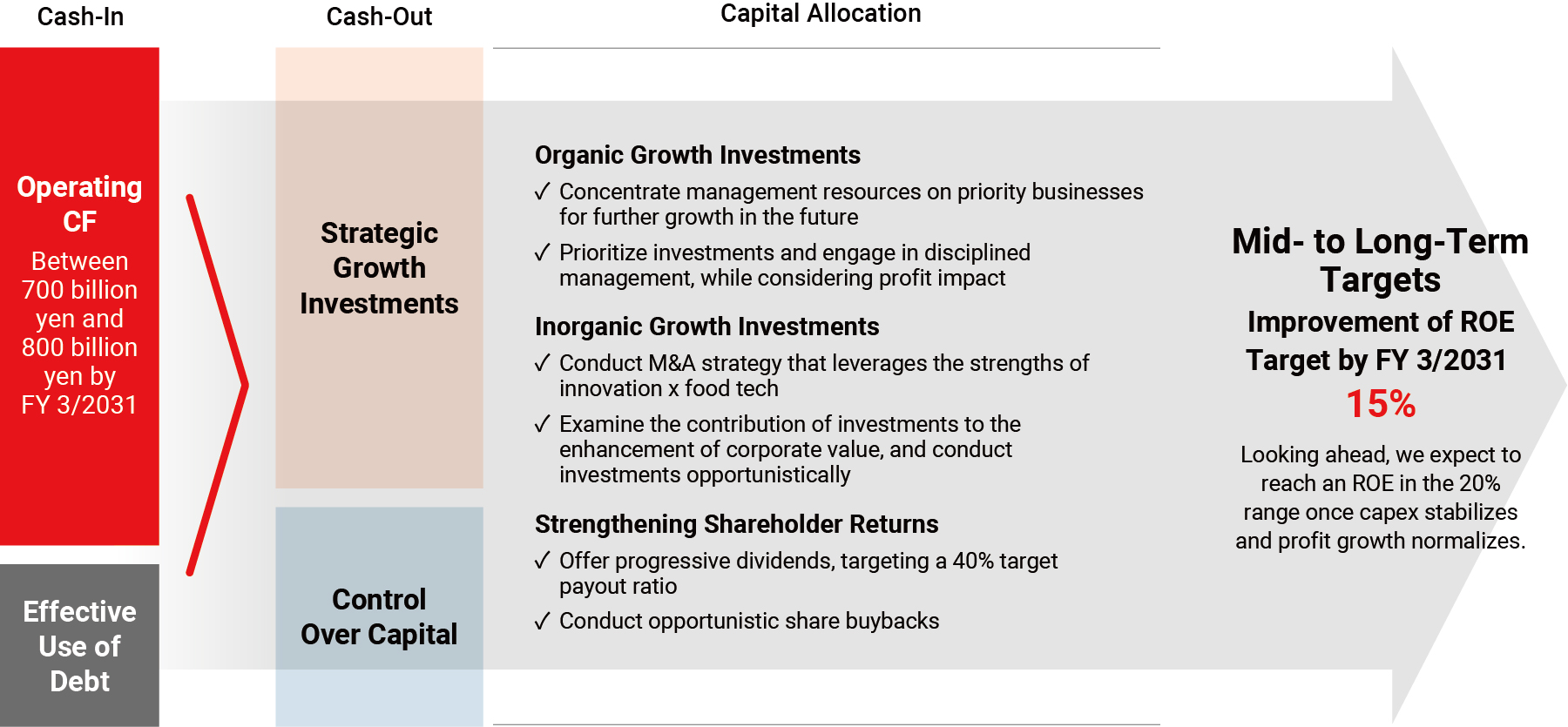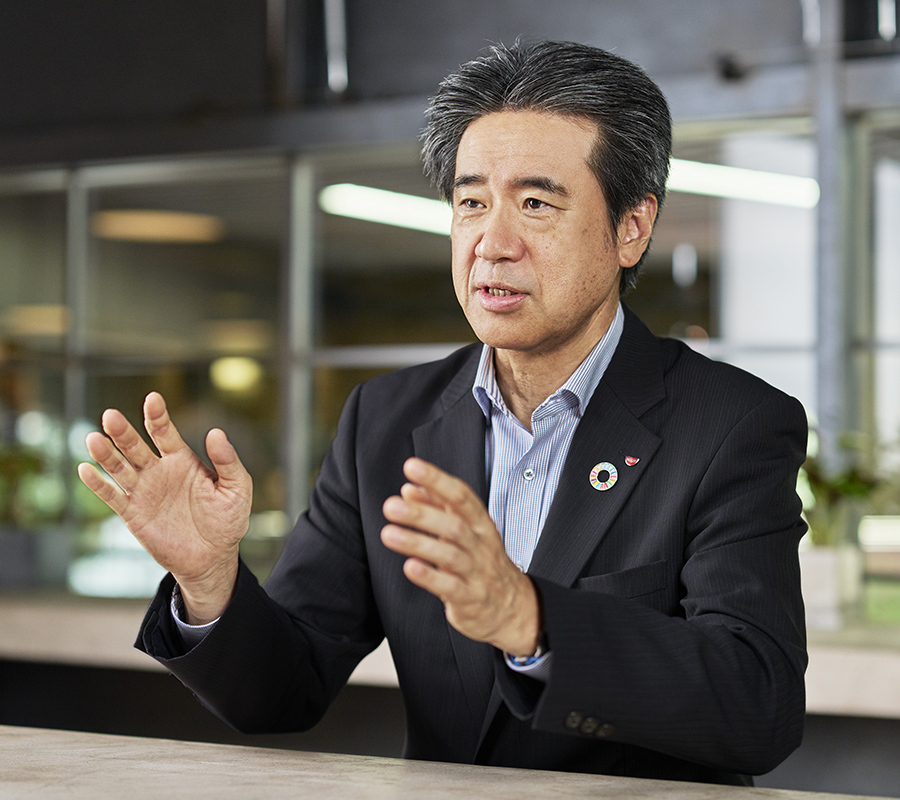CFO Message

Becoming a Truly Global Company Through Strategic Capital Allocation to Enhance Corporate Value
Takashi Yano
Executive Officer, CFO
NISSIN FOODS HOLDINGS CO., LTD.
Achieved FY 3/2031 Profit Margin Target Through Inorganic Growth and Strengthened Existing Businesses
FY 3/2024 was our third year operating under Mid- to Long-Term Growth Strategy 2030. We saw an acceleration of growth after two years of solid performance, with record-high revenue of 732.9 billion yen, up 63.7 billion yen, or 9.5%, year on year. Core operating profit of existing businesses was 80.6 billion yen, a significant increase of 20.4 billion yen, or 33.9%, year on year. Our resulting compound annual growth rate (CAGR) of 24.4% for the most recent three years far exceeded the target growth rate of mid-single digits. ROE was 11.7%, which also exceeded our long-term target level of 10%.
| (Billions of yen) | Institutional accounting basis FY 3/2024 | ||
|---|---|---|---|
| YoY | YoY | ||
| Amount | Ratio | ||
| Revenue | 732.9 | + 63.7 | + 9.5% |
| Core operating profit of existing businesses | 80.6 | + 20.4 | + 33.9% |
| Operating profit | 73.4 | + 17.7 | + 31.9% |
| Profit attributable to owners of the parent | 54.2 | + 9.4 | + 21.0% |
| Core operating profit margin of existing businesses | 11.0% | + 2.0pt | - |
| OP margin | 10.0% | + 1.7pt | - |
| Profit attributable to owners of the parent margin | 7.4% | + 0.7pt | - |
By segment, the Domestic Instant Noodles Business turned in solid performance, while the Domestic Non-Instant Noodles Business and Overseas Business saw dramatic growth.
In the Domestic Instant Noodles Business, two consecutive years of price revisions settled in the market, and high-value-added products performed well. The combination led to an increase in profit, despite the continued upward movement in materials costs.
NISSIN YORK and KOIKE-YA drove Domestic Non-Instant Noodles Business profit. One factor was the high degree of opportunistic agility demonstrated by both companies, which quickly developed high-value-added products that accurately met changing market needs. For example, NISSIN YORK continues to increase market share for health-enhancing products such PILKUL MIRACLE CARE, which improves sleep quality, an important factor in maintaining good health. KOIKE-YA marketed its first-ever premium potato chips product to meet the needs of the younger generation. This product anticipated a change in the market, as people begin to eat fewer formal meals and more snacks. At the same time, we leveraged the NISSIN FOOD PRODUCTS strengths in marketing across the group, leading to successful commercial strategies and a stronger brand image for the two companies.
The Overseas Business posted higher revenue and profit, with revenue of 270.8 billion yen, up 11.5% year on year, and core operating income of 45.7 billion yen, up 53.6%. Looking at top-line revenue by region, The Americas provided the largest contribution, growing by 14.5%. EMEA was up 34.3%, and Asia was up 11.4%. Every region reported double-digit growth, except for China, which was affected by an economic slowdown. This dramatic growth was fueled in part by the lower barrier to entry for instant noodles overseas in the wake of the COVID-19 pandemic. When COVID-19 began spreading around the world, food was in short supply in supermarkets overseas. Customers bought up the instant noodles left on the shelves, which consumers found to be delicious and easy to prepare. Many people learned the benefits of instant noodles as a safe packaged food with a long shelf life, perfect for eating while working from home. In the wake of the pandemic, instant noodles consumed per capita increased significantly, particularly in countries that have not traditionally eaten instant noodles.
Japanese people eat about 50 servings of instant noodles per person per year. That figure is in the single digits in Europe and only around 10 servings in the Americas. Considering the relatively high GDP per capita in Western countries, we expect this market to continue to grow for high-value-added products. Under the concept of innovative premium in the U.S., we are developing premium products linked to new styles and delicious flavors of instant noodles. We hope to expand these products to Europe and increase the number of meals consumed per capita there as well. In Asia, the number of people eating premium products is already relatively high. Demand for premium bag- and cup-type instant noodles—areas in which we excel—is increasing as income levels rise, and we will focus on premium products in this region as well.
The NISSIN FOODS Group is the only company that operates an instant noodle business with bases and factories on a global scale, with facilities and offices in Asia, the Americas, and Europe. We will leverage this global presence as a strength to build our Overseas Business.
Strategic Use of Abundant Cash for the Next Stage of Growth
From a financial standpoint, we see it as a great achievement that we achieved our initial target for 2030 in only three years. Core operating profit exceeded plan by about 30 billion yen, and cash flow rose to the 100 billion yen level in terms of EBITDA, indicating a solid business foundation for stable cash generation. With more financial options, we have greater flexibility for capital investment and other uses.
And we intend to use cash flow effectively to maximize corporate value through strategic growth investments and further ROE improvements. Specifically, we changed our financial KPIs in our Mid- to Long-Term Growth Strategy to continued mid-single-digit profit growth on an organic basis and ROE of 15% by FY 3/2031. To achieve an ROE of 15%, we plan to combine investments in organic growth, investments in inorganic growth, and shareholder returns. Even assuming no inorganic growth through M&A and only about 5% organic growth, we will consider ways to achieve these targets through share buybacks and other means. In this case, we estimate that we will maintain the level of net debt at 2 times EBITDA, and we see no cause for concern about financial safety.
As our next milestone, the NISSIN FOODS Group announced our aim to achieve revenue of 1 trillion yen, core operating profit of 100 billion yen, and market capitalization of 2 trillion yen by 2030. Setting these targets means we are entering a phase to set our sights on drawing level with the largest global food manufacturers. Our message is that ROE of 15% is not a final goal, but rather a milestone toward achieving ROE in the 20% range when we fully utilize capital investments in the future and accelerate profit growth.
To expand the scope of our business beyond 2030, we intend to raise capital efficiency through capital investments and expanded shareholder returns, while leveraging debt at the same time. This capital investment will contribute to the next stage of growth and bloom after 2030. Sales and profits will increase, cash inflows will increase, and the company will use the cash inflows to repay debt as we consider further growth strategies.
Approach to Capital Allocation for ROE Improvement

Visualizing the Growth Potential of the NISSIN FOODS Group as a Corporate Value Enhancer
I define my vision for the Finance and Accounting Division to be a corporate value enhancer. In other words, my mission is to play both offense and defense in maximizing NISSIN FOODS Group value creation, enhancing corporate value on a global basis, maintaining our businesses as going concerns, and minimizing costs.
We were selected as a Company with Significant Improvements in Disclosure in the Awards for Excellence in Corporate Disclosure announced yearly by the Securities Analysts Association of Japan. This recognition acknowledged our IR stance that emphasizes visualizing the growth opportunities of our group and communicating these opportunities to our shareholders and investors, amid calls for management to be conscious of the cost of equity and share prices. Our ranking in the food category rose to fifth in the same selection, up from eighth place last year. In FY 3/2024, our IR staff and I visited domestic and overseas offices to confirm current issues and results directly. We deepened communication with analysts and institutional investors by providing them with local, up-to-date information based on our experience in the market environments in each country. We also held briefings to communicate our efforts in such areas as generative AI and the 2024 Logistics Problem. For the first time in five years, we held small meetings between the CEO and institutional investors, and for the first time ever, we held small meetings between outside directors and institutional investors. We organized a tour of NISSIN Foods (Thailand). for analysts and institutional investors to help them understand the marketability of our products in Asia, and we also hosted a tour of our state-of-the-art next-generation smart factory, the Kansai Plant.

The NISSIN FOODS Group will continue to develop global business and provide information to analysts and institutional investors. At the same time, we will carefully explain our strengths, growth potential, and other matters quantitatively and qualitatively. These matters include our strengths in branding and marketing cultivated in Japan over many years, active development of high-value-added instant noodles and other products, leveraging our unique technologies and numerous patents, and product development that enthusiastically incorporates considerations of health and the environment.
We believe there is enough room for NISSIN FOODS Group profit growth in every one of our target global markets. We have the ability to develop products that meet the tastes of each region and its consumers. Within the company, we actively discuss capital policies and other matters that support these policies. We will continue to implement measures that highlight our strengths and achieve our goal to become a corporate group regarded highly by our shareholders and investors.
VALUE REPORT
2024
WHO
is the NISSIN FOODS Group? [3.31MB]
- Group Philosophy
- Social Value Creation History
- NISSIN FOODS Group Today
- Six Capitals of the NISSIN FOODS Group
- Core Strengths of the NISSIN FOODS Group
WHAT
are our goals?[3.49MB]
- Our Materiality
- CEO Message
- COO Message
- Outside Director Dialogue
HOW
will we achieve our goals?[8.89MB]
- Value Creation Process
- CSO Message
- CFO Message
-
Growth Strategy 1: Strengthen Cash Generation Capabilities of Existing Businesses
- Domestic Instant Noodles Business
- Domestic Non-Instant Noodles Business
- Overseas Business
-
Growth Strategy 2: EARTH FOOD CHALLENGE 2030
- Challenge to Climate Change
- Challenge to Effectively Use Resources
- Growth Strategy 3: Pursue New Businesses
- Creating and Expanding Touchpoints for Optimized Nutri-Dense Meals
- Creating New Value in Optimized Nutri-Dense Meals
- CHRO Interview
- Strengthening Human Capital
- IR Event Report
- Corporate Governance
- Board of Directors and Audit & Supervisory
Board Members
Data [554KB]
- Financial Summary
- Non-Financial Summary / Major External Evaluations
- Global Instant Noodle Market Data
- Company and Stock Information